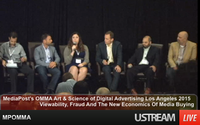 Magnetic CEO James
Green says his firm has figured out a simple, elegant and -- he claims -- fool-proof solution to weeding out bot-driven digital ad fraud. Not surprisingly, it requires someone to spend money.
Magnetic CEO James
Green says his firm has figured out a simple, elegant and -- he claims -- fool-proof solution to weeding out bot-driven digital ad fraud. Not surprisingly, it requires someone to spend money.
But in this case, he’s not referring to brand marketers or their agency teams spending money, but the consumers they are trying to reach.
“One thing a bot can’t do, is
spend money,” Green explained during the “fraud” panel Tuesday morning at OMMA Art & Science in Los Angeles.
Specifically, Green said Magnetic’s solution involves
accessing data from “350 retail clients” to track when online users actually buy something at e-tail. When online users spend money to buy something, he said, it’s a pretty good
assumption they’re not a bot.
advertisement
advertisement
“We haven’t seen a bot go out and spend money with a retailer -- yet,” Green quipped, adding, “So we know that’s not
fraud.”
Green described the retail data effort as a “major initiative” at Magnetic, and estimated its database generates “60-70%” of its impressions from
“known people."
“That is a very effective way of covering fraud,” he said.
Another effective way to combat fraud, according to Green? Just stop buying exchanges that
perpetuate it.
In fact, he called on the industry to rally against bad apple exchanges and to throw their support to the good ones.
“All exchanges are not created equal,”
Green asserted, saying that it is pretty easy to identify which exchanges perpetuate bot fraud simply by utilizing one of the big fraud verification solutions -- companies like Moat, Double Verify and
Integral Ad Science -- and use that to benchmark which exchanges index the highest.
“Go to those exchanges that are worse and refuse to pay,” Green demanded.
While he would
not “call out” any of the worst offenders, he did single out one of the best players, in his assessment.
“The guy who is doing it the best is Google,” Green shared.
“We see less fraud and activity on Google’s ad exchange than anyone else.”
The panel can be seen in full below:
Broadcast live streaming video on Ustream